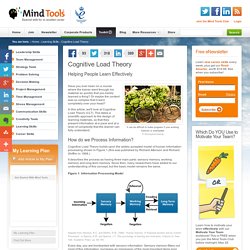

Factors Effecting Learning Outcomes. Cognitive Load Theory - Learning Skills From MindTools.com. Helping People Learn Effectively It can be difficult to make progress if your working memory is overloaded. © iStockphoto/alandj Have you ever been on a course where the trainer went through his material so quickly that you barely learned a thing?

Or maybe the content was so complex that it went completely over your head? In this article, we'll look at Cognitive Load Theory (CLT). How do we Process Information? Cognitive Load Theory builds upon the widely accepted model of human information processing shown in Figure 1 (this was published by Richard Atkinson and Richard Shiffrin in 1968.) It describes the process as having three main parts: sensory memory, working memory and long-term memory. Figure 1: Information Processing Model Adapted from Atkinson, R.C. and Shiffrin, R.M. (1968).
Every day, you are bombarded with sensory information. Information from your sensory memory passes into your working memory, where it is either processed or discarded. What is Cognitive Load Theory? 1. 2. 3. 4. Forget About Learning Styles. Here’s Something Better. Tuesday, October 15, 2013 Whenever I speak to audiences about the science of learning, as I’ve been doing a lot this fall, one topic always comes up in the Q&A sessions that follow my talk: learning styles.

Learning styles—the notion that each student has a particular mode by which he or she learns best, whether it’s visual, auditory or some other sense—is enormously popular. It’s also been thoroughly debunked. The scientific research on learning styles is “so weak and unconvincing,” concluded a group of distinguished psychologists in a 2008 review, that it is not possible “to justify incorporating learning-styles assessments into general educational practice.”
A 2010 article was even more blunt: “There is no credible evidence that learning styles exist,” wrote University of Virginia cognitive scientist Daniel Willingham and co-author Cedar Riener. This doesn’t mean, however, that teachers and parents should present material to be learned in just one fashion. Zone of Proximal Development. The Zone of Proximal Development. Brain Research - Zone of Proximal Development. ZoPD. Assessing the ZoPD Gap. ZoPD Gap. Vygotsky's Zone of Proximal Development. Beyond the Comfort Zone. 7 Things You Need to Know About Getting Out of Your Comfort Zone. Everybody knows how to say it.

“You’ve get out of your comfort zone. That’s where the magic happens.” But it’s always so easy to say it. It’s the doing that is actually hard. Starting to get out of your comfort zone is easy. The comfort zone and outside of it is tricky. 1) You’ve to raise your standards. Scaffolding. Types of Scaffolding. Scaffolding Strategies. ZoPD Defined. Basic Principles of ZoPD. ZoPD - cognitive development theory. ZoPD Theory. ZoPD vs Piaget.